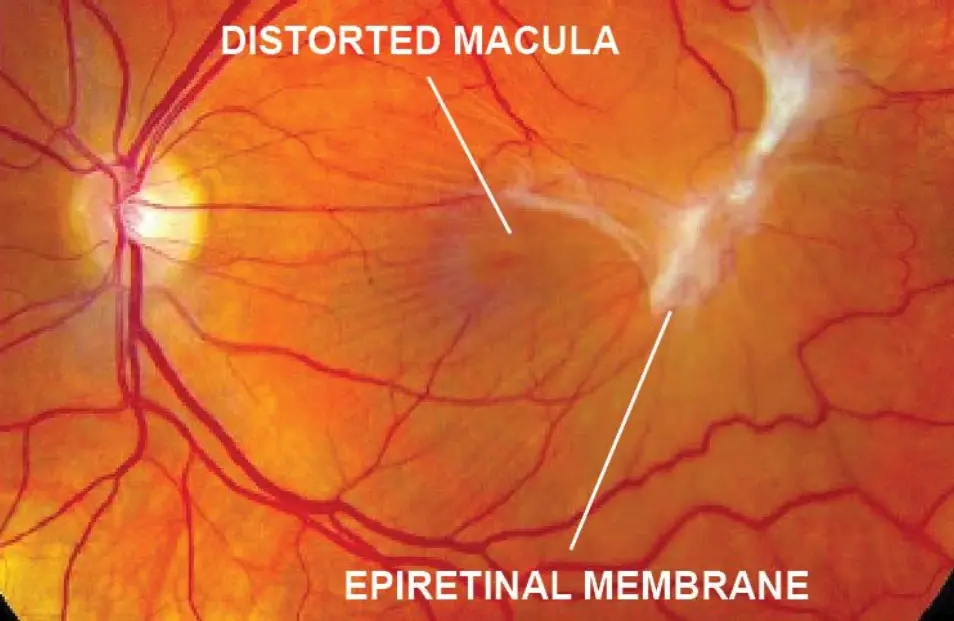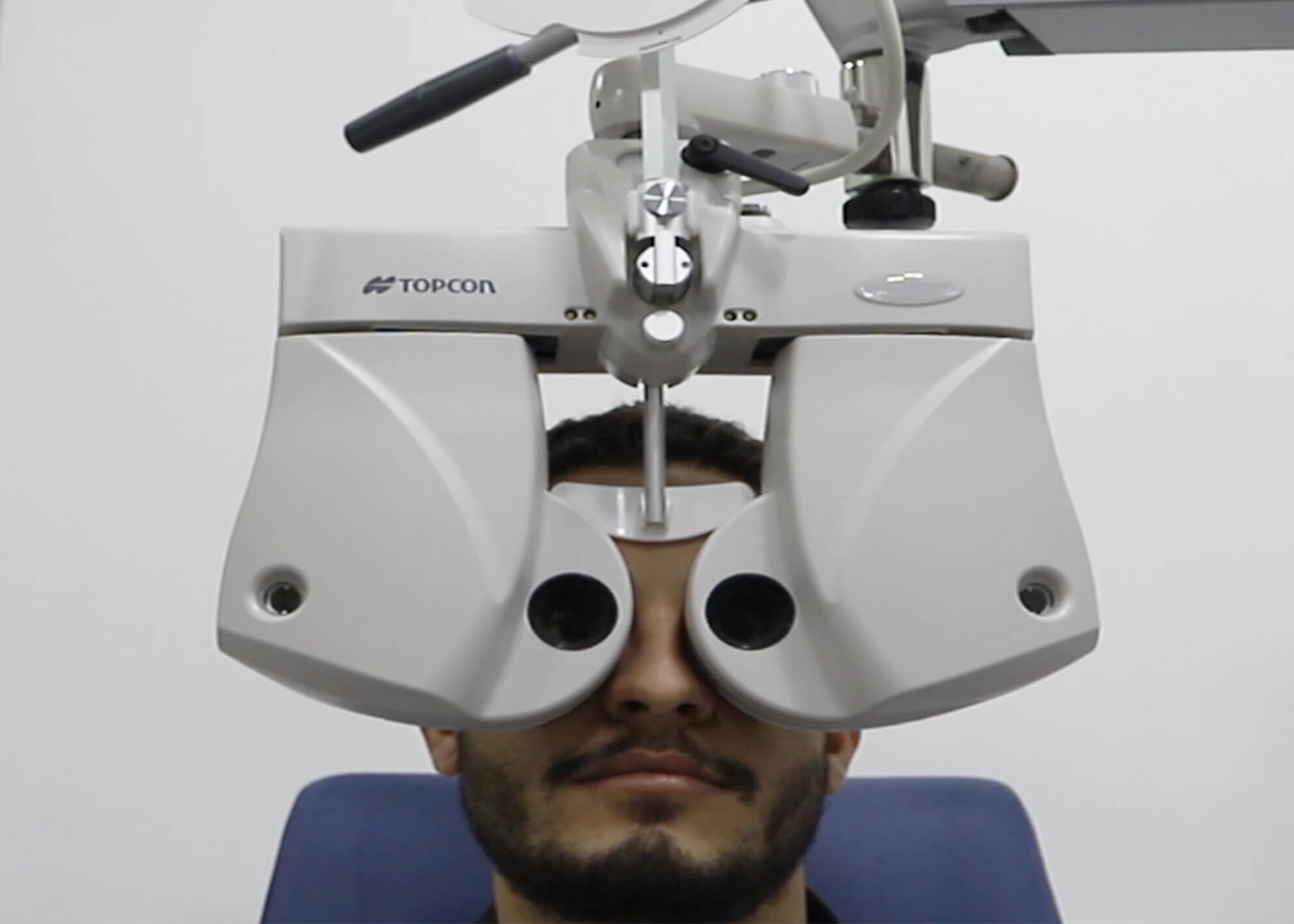Epiretinal Membrane (Macular Pucker) at Eye Clinic DRHC Dubai
What is Epiretinal Membrane?
An Epiretinal Membrane (ERM), also known as macular pucker, is a thin layer of fibrous tissue that forms on the surface of the retina, specifically over the macula—the central part responsible for sharp, detailed vision. While ERM is typically benign and progresses slowly, it can lead to vision distortion, blurriness, and in some cases, significant visual impairment if left untreated.
Causes and Risk Factors
Epiretinal Membranes can develop due to several factors, including:
- Aging: The most common cause, as the vitreous gel in the eye naturally shrinks and pulls away from the retina, leading to membrane formation.
- Retinal Tears or Detachments: Can trigger the formation of scar tissue on the retina.
- Eye Trauma or Surgery: Previous eye injuries or surgeries, such as cataract removal, can increase the risk of ERM.
- Inflammatory Eye Diseases: Conditions like uveitis can cause inflammation, leading to the development of ERM.
- Diabetic Retinopathy: Diabetes-related retinal issues can contribute to membrane formation.
Symptoms of Epiretinal Membrane
The symptoms of ERM can vary depending on the severity of the condition:
- Blurred Vision: Vision may become progressively blurry, especially when reading or focusing on fine details.
- Distorted Vision: Straight lines may appear wavy or bent, a condition known as metamorphopsia.
- Difficulty Reading: Fine print may become increasingly difficult to read, even with glasses.
- Double Vision: Some patients may experience double vision in the affected eye.
- Central Vision Loss: In advanced cases, central vision can be significantly reduced.
Diagnosis of Epiretinal Membrane
At DRHC Dubai, we use advanced diagnostic techniques to accurately diagnose ERM:
- Medical History and Symptoms Review: The ophthalmologist will discuss the patient's symptoms, such as blurred or distorted vision, difficulty reading, and seeing wavy images.
- Dilated Eye Examination: Allows our ophthalmologists to examine the retina and detect any abnormalities on its surface.
- Optical Coherence Tomography (OCT): Provides high-resolution cross-sectional images of the retina, enabling detailed visualization of the epiretinal membrane and its effect on the macula.
- Fluorescein Angiography: This test involves injecting a dye into the bloodstream to highlight blood vessels in the retina and assess any related abnormalities.
- Amsler Grid Test: The Amsler grid is a simple test used to detect vision problems related to the macula. Patients look at a grid of lines and report any distortions, which can help identify the presence of an epiretinal membrane affecting the central vision.
- B-scan Ultrasonography: If the view of the retina is obstructed, such as by cataracts, a B-scan ultrasound may be used to visualize the retina and detect the presence of an epiretinal membrane.
Treatment Options for Epiretinal Membrane
Treatment for ERM depends on the severity of symptoms and the impact on the patient’s vision. At DRHC Dubai, we offer a range of treatment options:
- Observation
- In cases where the ERM is mild and causes minimal symptoms, regular monitoring may be recommended.
- Periodic eye exams are conducted to track the progression of the membrane.
- Vitrectomy Surgery
- Vitrectomy: The most effective treatment for symptomatic ERM, involving the surgical removal of the vitreous gel and the epiretinal membrane itself.
- Membrane Peeling: During vitrectomy, the membrane is carefully peeled away from the surface of the retina to relieve traction and improve vision.
- Outcomes: Most patients experience significant improvement in visual clarity and distortion following surgery, although full recovery can take several months.
Post-Surgical Care and Recovery
After vitrectomy surgery, careful post-operative care is essential for a successful recovery:
- Follow-Up Visits: Regular follow-up appointments to monitor healing and assess visual improvement.
- Medications: Use of prescribed eye drops to prevent infection, reduce inflammation, and manage intraocular pressure.
- Activity Restrictions: Patients may need to avoid strenuous activities, heavy lifting, and certain head positions during the recovery period.
- Visual Rehabilitation: In some cases, visual therapy may be recommended to help patients adjust to changes in their vision post-surgery.
Why Choose DRHC Dubai for Epiretinal Membrane Treatments?
At DRHC Dubai, we are committed to providing the highest standard of eye care using state-of-the-art technology and techniques. Our experienced ophthalmologists are specialists in treating epiretinal membrane and other retinal conditions. We offer personalized treatment plans tailored to each patient’s unique needs, ensuring the best possible outcomes.
.png?width=281&height=59&name=bookanappointment%20(1).png)
At Dr. Rami Hamed Center, our Ophthalmology department is dedicated to safeguarding your vision health through expert eye care Professionals, Renowned as one of the best eye care clinics in Dubai our Ophthalmology Specialists provide services for Cataract, Retina treatment with Laser and Refractive surgeries.




.png?width=281&height=59&name=bookanappointment%20(1).png)






